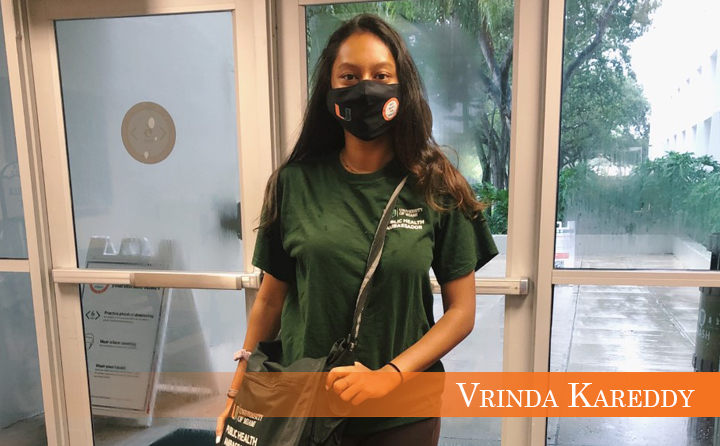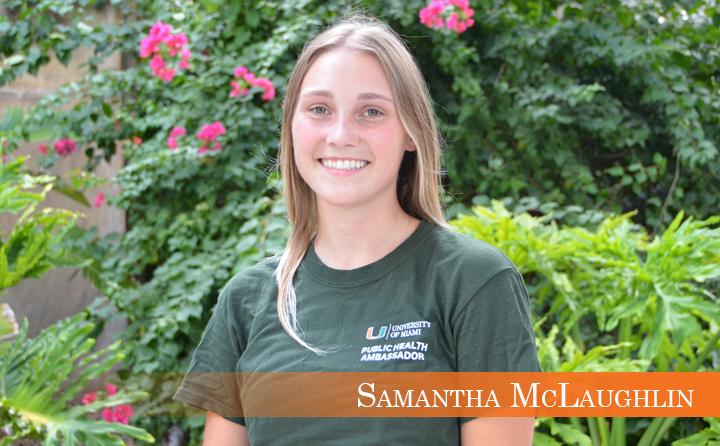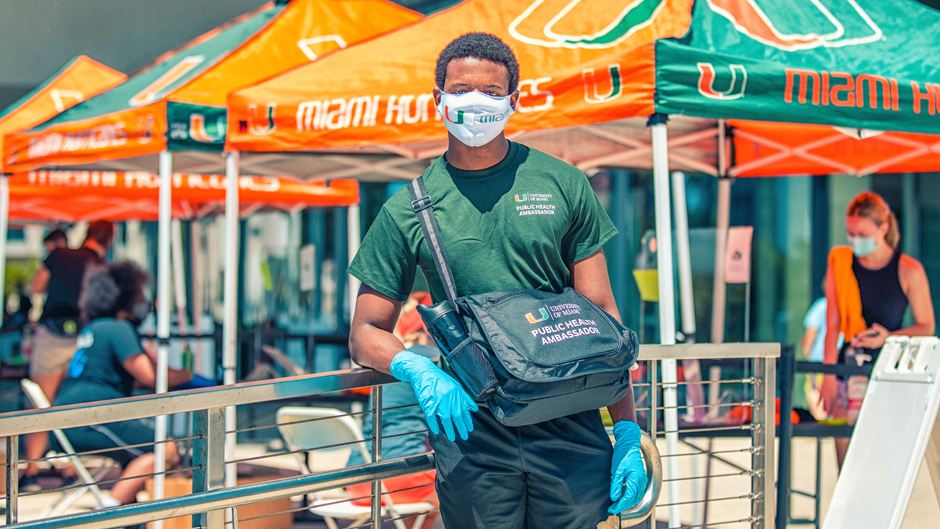When the University of Miami Butler Center for Service and Leadership announced a Public Health Ambassadors Program to support the University’s COVID-19 reopening and operating plan, more than 270 UM students applied for the important role of public health ambassador. SONHS is proud to announce that 24 of the 75 inaugural public health ambassadors selected are students from the School of Nursing and Health Studies. Three of those dedicated SONHS students recently talked about their peer-to-peer roles as public health ambassadors. Photo credits: Mike Montero, Rohan Dureja, Javier A. Corrales.
Jacques Calixte, Class of 2024
For Jacques Calixte, a first-year School of Nursing and Health Studies student in the health science premed track, being involved in several roles simultaneously is nothing new.
“I’m used to a lot of responsibility. I was the type of person in high school who took on every single club and sport. So applying for the role as a public health ambassador felt natural,” Calixte pointed out back in August, during his first week on the job.
When Calixte heard about the creation of the public health ambassadors, who would support the safe reopening of the Coral Gables Campus this Fall, he thought it would be a perfect learning opportunity.
As part of the 2020 class of high school graduates, explained Calixte, “I personally know what it feels like to be affected by COVID-19. And as an aspiring physician, I thought it would be interesting to apply the love that I have for the health field. I really wanted to do something that would be able to help the community, so applying to this job felt like the best option.”
As an ambassador, Calixte hopes to keep educating people throughout the semester. “I just hope people come up to me and ask me for information, and I hope to keep informing people and help influence them in following important guidelines,” he said.
Calixte also admitted he would use his role as an ambassador to meet new people and become familiar with campus. “I’m getting the opportunity to learn a lot about different parts of campus before other incoming freshmen. I’ve gotten lost a couple of times, but this role has made the process of coming to UM easier,” he said. “I actually have run into a couple of familiar faces while walking around, and I’ve made friends with people who have asked me for help.”
Calixte was happy to report that his first week on the job was successful. “I only had to give out one mask throughout the whole week. The main problem I’ve come across is that people aren’t wearing their mask correctly. So, I’ve just had to remind them. But people have been very compliant about following the policies,” he said.
Overall, Calixte is looking forward to starting his journey as a ’Cane. “I’m so excited to finally join the UM community,” he exclaimed. “I’ve heard a lot of great things, and everyone is really supportive. I know this year is going to look different, but I do hope I get to experience what it’s like to truly be a ’Cane!” —Amanda M. Perez/News@TheU
Vrinda Kareddy, Class of 2022

When Vrinda Kareddy started volunteering on ambulances as a teen in her hometown of Westport, Connecticut, she was struck by the number of underlying conditions even seemingly healthy patients would rattle off when she took their patient history. So, Kareddy, who received her EMT license in 10th grade, knew how devastating COVID-19 could be when it hit her town, and how important it would be to try and prevent its spread.
Luckily, she said, her town got it right: “I witnessed my hometown transform from one of the areas with the highest number of cases in the U.S., being miles away from the former epicenter of New York City, to one of the counties with a consistent downward trend and a less than 1 percent positive test rate."
Though Kareddy chose not to work as an EMT over the summer in order to protect her parents and grandparents from potential exposure, she knew once she returned to campus that she wanted to find a way to make a difference.
“I have seen firsthand the importance and success of practicing expert guidelines on combating this pandemic and want to ensure that the same mindset and practices of my home community are practiced in the UM community,” Kareddy said. "I see it as my duty to do this to the best of my ability regardless of being a public health ambassador, but being one definitely aids and mobilizes me in doing so.”
Kareddy, an aspiring physician working on dual degrees in microbiology and immunology and public health, has found her patrols around Lakeside Village and Mahoney Pearson to be fairly routine. “Occasionally I need to hand out a mask,” she said. “There are only a few times per shift I need to ask people to put their mask on, and the response is positive and non-problematic. I personally have not had any situations where I've had to get the Dean of Students Office or UMPD involved, but I do know of cases where other public health ambassadors have had to.”
Kareddy admits that seeing the rise in positive numbers on UM’s COVID-19 dashboard during the first few weeks of the semester was alarming, yet unsurprising given what's happening at other college campuses around the nation. “I definitely have some worry about exposure to COVID-19 on campus and would be concerned for anyone who did not have any apprehension,” said Kareddy, who opts to visit a drive-through testing site off campus every two weeks. “While I have never shown any symptoms of COVID-19 or been in contact with anyone with COVID-19, getting tested gives me a peace of mind and is something I think every UM community member should be encouraged to do frequently, especially since it is free. I received my negative test results only a few days after getting tested.”
Even if she hadn’t been chosen to represent UM as a public health ambassador, Kareddy would be equally passionate about preventing the spread of COVID-19 on campus. “As a public health student,” she explained, “the importance of preventing the spread of disease or virus and ensuring quality of life in our community is at the forefront of my personal values.” — Robin Shear/SONHSNews
Samantha McLaughlin, Class of 2021

Samantha McLaughlin has traveled to Malawi, Ghana, and Panama to pursue her passion for global medicine. But this fall, UM’s Public Health Ambassador Program gave her the chance to take on a global health crisis much closer to home.
“The position of public health ambassador gave me the opportunity to apply my knowledge and passion for public health in a real-world, hands-on situation,” said McLaughlin. “As a team leader, specifically, I can assist in the development of public health programs and work alongside professionals in this field.”
McLaughlin takes seriously her duty to monitor mask-wearing and social distancing. “In the rare event that someone is not following these guidelines, I politely approach them to explain what the policy is—whether it be wearing a mask during exercise or only seating four people per table—and ask them to abide by it,” she explained. “In a normal three-hour shift, I may have to approach five to ten students. For the most part, all of the students adhere to these guidelines and are genuinely devoted to keeping everyone safe. The saying ‘Canes Care for Canes’ is more important now than ever before, and everyone is living by this."
A junior working toward dual degrees in public health and microbiology and immunology, McLaughlin will start the Medical Scholars Program at UM’s Miller School of Medicine next Fall. This past summer she took part in the SONHS’ Minority Health and Health Disparities Research Training program. With a background in medicine and public health, McLaughlin plans to focus on providing long-term prevention and medical solutions to the unique problems faced by resource-poor countries.
“Medicine, research, education, and public health measures are all key to alleviating global health problems,” she said. “Clinical treatment must be supplemented by public health interventions that focus on delivery of care and medications, as well as societal factors that impact health, such as education, income, socioeconomic status, sanitation, and geography.”
The opportunity to put some of this theory into practice recently has given McLaughlin a new perspective. "In this unprecedented time of turmoil and stress, I am truly proud to be a ’Cane," she said. "This experience has showed me that the University has robust plans and guidelines in place to ensure the safety and well-being of our community.”
Learn more about the University of Miami Public Health Ambassadors program here.

